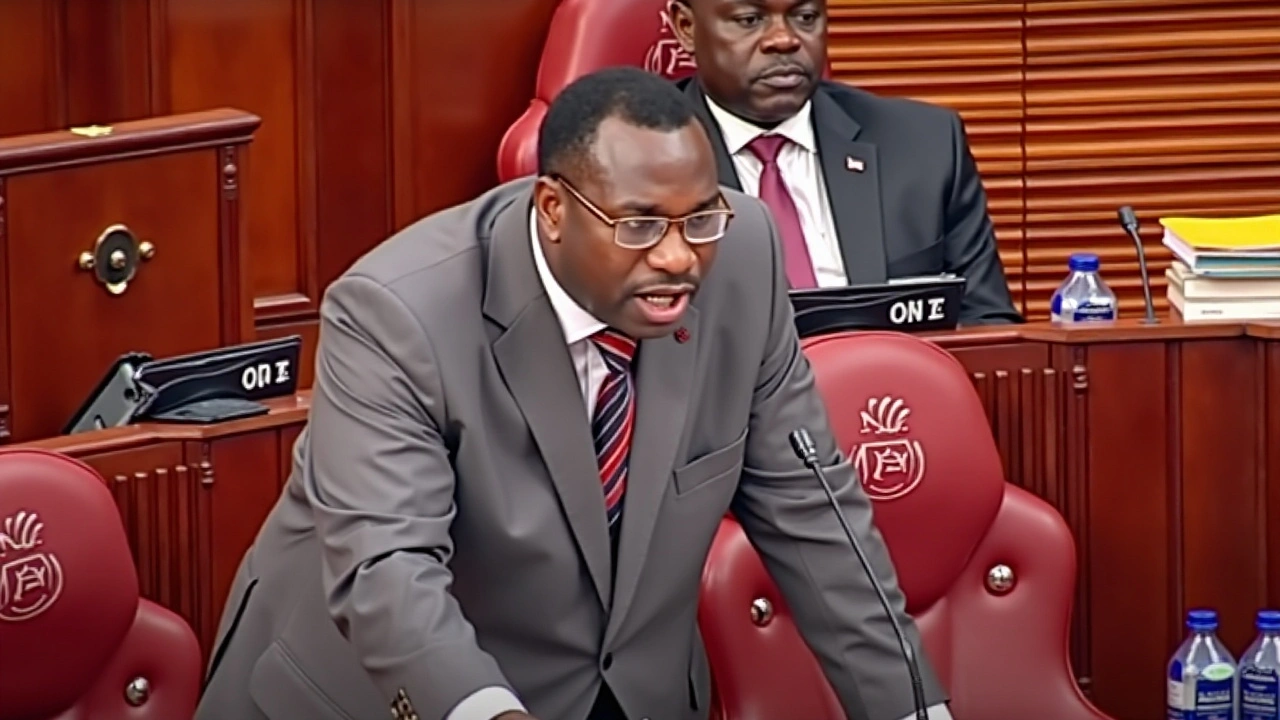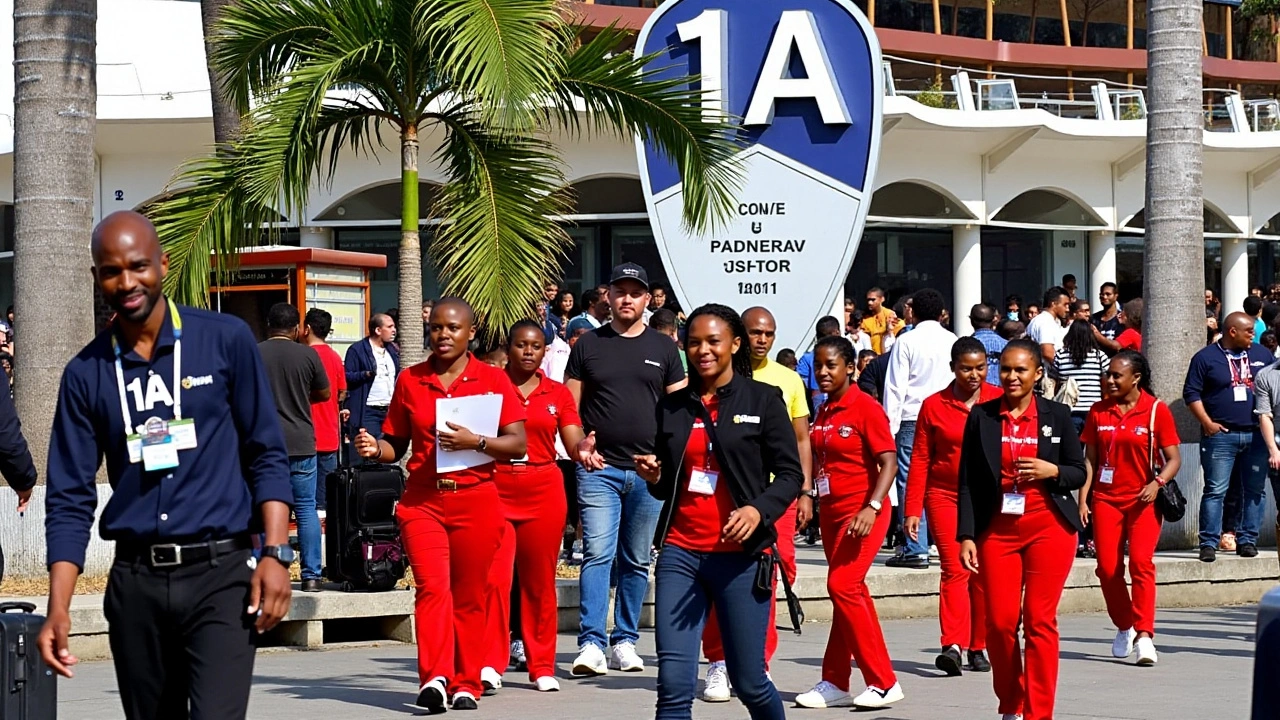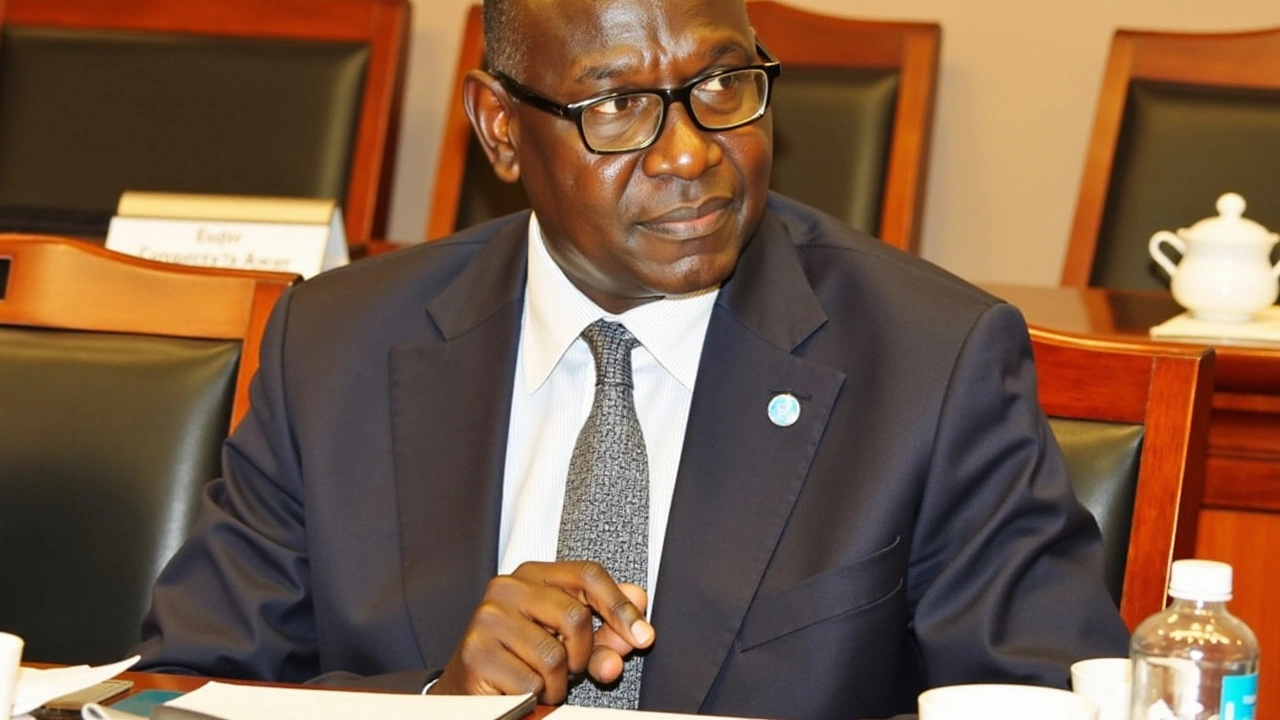Powerful Influences Scrutinized in JKIA-Adani Group Concession Bid, Kenyan Senators Claim
 Sep, 13 2024
Sep, 13 2024
Kenyan Senate Raises Concerns Over JKIA-Adani Concession Bid
The concession bid for the Jomo Kenyatta International Airport (JKIA) has come under scrutinous light as Kenyan senators express significant apprehensions. Allegations are swirling around the deal involving the Adani Group due to the suspicious rapidity with which the feasibility study for the project was completed. The study, pivotal in assessing such a high-stakes bid, was wrapped up in an unusually brief span of just 14 days. This expedited process has raised red flags, prompting questions about the integrity and transparency of the selection process.
Suspicions of Undue Influence
The primary worry voiced by the senators centers around the possible involvement of powerful interests in pushing the JKIA-Adani Group concession bid. The haste with which the feasibility study was conducted stands in stark contrast to the norm for such intricate and far-reaching projects. Typically, such assessments involve extensive analysis, consultation, and due diligence to ensure no stone is left unturned, ranging over several months rather than days. The fact that the JKIA-Adani study bypassed this exhaustive process has led many to question the credibility of the evaluation and, ultimately, the fairness of the bidding procedure.
For an airport of JKIA's standing – a critical hub for East Africa and a pillar of Kenya's economic framework – the very notion of a rushed decision is fraught with risks. Issues such as safety, efficiency, and sustainability of future operations are paramount. These concerns dovetail with the risks of setting a precedent for future concession bids, potentially opening the doors for similar rapid and opaque decision-making processes in other sectors.
Transparency Under Scrutiny
With the gravity of the situation in mind, the senators have argued emphatically for a more transparent and rigorous evaluative process. According to them, the current approach not only jeopardizes the integrity of the JKIA concession bid but also threatens the trust of the Kenyan public and international stakeholders in the nation's infrastructural projects. In the backroom dealings that typically characterize rushed projects, there is a palpable fear that crucial aspects and objections might be glossed over, if not entirely ignored, in the eagerness to seal the deal.
Such a transformative project for JKIA necessitates an unbending adherence to transparency. Every phase, from bid announcement to contract award, should pass through public scrutiny to ensure that the awarded concession is truly in the country's best interest. The rise of Kenya as a regional power in East Africa hinges critically on maintaining robust oversight mechanisms to safeguard its infrastructural investments.
Call for Detailed Examination
The senators' call for a detailed and exhaustive review of the feasibility study rings louder with every revelation. A thorough re-evaluation is not just a call for procedural compliance but a necessity in terms of long-term national interests. The stakeholders, including the Kenyan aviation authorities and the public, deserve unquestionable assurance that every aspect of the concession has been vetted with clinical thoroughness.
Moreover, the clamor for transparency has a broad base of support. Civil society organizations, economic analysts, and even international aviation experts underscore the imperative of a well-considered, thoroughly vetted decision. The concessional framework must adhere to global best practices, ensuring that it fortifies Kenya's aviation sector rather than sowing seeds of discord and inefficiency.

Implications for Kenya's Aviation Sector
The ramifications of the JKIA concession bid, encompassing the Adani Group's involvement, extend far beyond immediate financials. JKIA stands as a lifeline for both passenger and cargo transport across East and Central Africa. Any decisions affecting its operations will have rippling effects across the region's economic landscape. Ensuring the airport's optimum functioning is essential, not merely for Kenya's economic growth but also for upholding its geopolitical status.
Consequently, the call for a robust, transparent, and methodical assessment isn't merely academic. It's a pragmatic stance grounded in national interest. The process, however swift or prolonged, must unequivocally demonstrate impartiality, diligence, and an unfaltering commitment to the best outcomes for Kenya.
Future of Concessional Bids
The current JKIA-Adani Group concession bid is indicative of a larger quandary facing not just Kenya, but numerous nations contemplating major infrastructural investments. Balancing rapid economic advancement with stringent regulatory oversight, especially in sectors as vital as aviation, remains a tightrope act. The lessons from the JKIA saga underscore the critical need for a framework that marries efficiency with transparency, allowing economic progress without compromising on integrity.
For the Kenyan senators pushing for greater scrutiny, the demand isn't just for answers, but for setting a benchmark. If Kenya can navigate this turbulent phase with unmistakable clarity, the precedent it sets could serve as a guiding light for future infrastructural endeavors across the African continent.

A Shared Responsibility
In circumstances of profound national significance, the responsibility for transparency and diligence doesn't rest solely on the government or the bidding entities. It extends to the Kenyan public, media, and civil society organizations. A vigilant and informed populace is an essential pillar in safeguarding national assets against unscrupulous practices and ensuring that every infrastructural milestone aligns with the country's broader aspirations.
To the senators, the crux of the issue isn't just about a speedy feasibility assessment. It's about the ethos of national administration and the unwavering commitment to principled governance. As the JKIA-Adani Group concession bid continues to unfold, one thing remains clear – the eyes of a watchful nation are fixed on the outcome, with hopes that transparency, integrity, and national interest will prevail.

Ronda Onstad
September 14, 2024 AT 14:04Look, I’m not one to jump on the bandwagon, but 14 days for a feasibility study on a major international airport? That’s not efficiency-that’s a red flag wrapped in a PowerPoint presentation.
I’ve worked on infrastructure projects in three countries, and even the fastest ones took months. You don’t just slap together a report on airport safety, air traffic patterns, and long-term maintenance costs in two weeks. That’s like saying you’ve diagnosed a patient’s cancer after one glance at their X-ray.
The Adani Group has a history of aggressive expansion, sure, but what’s more troubling is how quickly the Kenyan government seems to be sidelining oversight. This isn’t about nationalism or foreign interference-it’s about basic governance. If we let this slide, what’s next? A 72-hour audit for a nuclear power plant?
Kenya deserves better. Not because Adani is evil, but because the process is broken. And broken systems don’t just fail-they corrupt everything they touch.
Let’s not confuse speed with progress. Real progress takes time, transparency, and teeth in the regulatory framework. Otherwise, we’re just building monuments to bad decisions.
Steven Rodriguez
September 16, 2024 AT 03:46Let’s cut the fluff. This isn’t about ‘transparency’-it’s about Kenya being exploited by global elites who think African nations are soft targets. Adani’s not some benign investor-they’re a corporate empire with a trail of broken contracts and silenced critics from India to Australia.
And now they’re sniffing around Kenya’s crown jewel? With a 14-day ‘study’? Please. That’s not due diligence-it’s a heist with a spreadsheet.
Senators are right to scream. But they’re wasting time asking for reviews. They should demand a full forensic audit, freeze the deal, and publicly name every official who greenlit this. If there’s a single email, a single meeting, a single phone call that ties this to political donors or foreign intermediaries-drag it into the light.
This isn’t just about an airport. It’s about sovereignty. And if Kenya lets this pass, they’re not just selling infrastructure-they’re selling their future to the highest bidder. And that’s treason dressed in corporate jargon.
Zara Lawrence
September 16, 2024 AT 04:4314 days? That’s statistically impossible unless the entire feasibility study was pre-written before the bid was even announced. And let’s be honest-how many of the ‘experts’ on that panel were former Adani consultants? How many were paid in offshore accounts? How many were never even qualified to assess aviation infrastructure?
I’ve seen this pattern before. In Nigeria, in Sri Lanka, in Peru. The same script: rapid approval, opaque bidding, ‘national interest’ as a shield, then the private entity takes control, raises fees, cuts corners, and the public is left with a crumbling asset and no recourse.
And now? The media’s quiet. The opposition is muted. The World Bank is silent. Coincidence? I think not.
Someone’s got a dossier. Someone’s got emails. Someone’s got bank records. And if you’re not digging for it, you’re complicit.
Don’t wait for the senators. File FOIA requests. Leak it. Burn it down.
Ashley Hasselman
September 16, 2024 AT 14:16Wow. A 14-day feasibility study. What a shocker. Next they’ll tell us the moon landing was filmed in a studio and the dinosaurs were just really big birds.
Can we please retire the phrase ‘transparency’? It’s been weaponized into a meaningless buzzword by people who’ve never actually read a contract.
Also, Adani? The same guys who got kicked out of Australia for environmental violations? Oh no, they’re coming to save Kenya’s airport. Sure. And I’m the Queen of England.
Just let the deal go through. Maybe then we can all laugh about how Kenya traded its future for a shiny new terminal and a bunch of Indian corporate PR.
Kelly Ellzey
September 17, 2024 AT 07:33Okay, hear me out-this isn’t just about Adani, or Kenya, or even airports… it’s about how we trust systems that were never meant to be trusted.
Think about it: we’ve trained ourselves to believe that speed = success, that big names = good outcomes, that ‘global investors’ = automatic progress. But what if that’s the lie?
What if the real win isn’t a new terminal with fancy lights, but a process where a single mom in Nairobi can read the feasibility report, understand it, and say, ‘this feels right’?
Maybe we’re so obsessed with growth that we forgot to ask: who benefits? Who gets left out? Who’s not at the table?
Let’s not just demand a redo. Let’s demand a revolution in how we do these things. Slower. Smarter. With more voices. Not just the ones with the loudest lawyers.
And hey-if you’re reading this and you’re Kenyan? You’re not powerless. You’re the heartbeat of this story. Don’t let them silence it.
maggie barnes
September 18, 2024 AT 01:2014 days? LOL. I bet the ‘study’ was written by a 22-year-old intern who got paid in crypto and a free flight to Dubai.
And now senators are acting shocked? Like they didn’t know this was coming? Wake up. This is how EVERY big African infrastructure deal goes. China, India, UAE-same script. Pay off the right people, rush the paperwork, then act all innocent when the airport starts collapsing in 5 years.
And don’t even get me started on ‘international experts’-half of them are consultants who’ve never set foot in Africa but charge $20k a day to say ‘looks good’.
Kenya’s not being exploited. Kenya’s just bad at playing the game. And now they’re crying about it? Pathetic.
Lewis Hardy
September 18, 2024 AT 06:16I don’t know much about aviation, but I do know this: when something moves too fast in government, especially with billions on the line, it’s usually because someone’s scared of what the truth might reveal.
Why rush a study that should take months? Is it fear of public backlash? Fear of competition? Fear that the real cost-benefit analysis would show this deal isn’t worth it?
I’m not anti-Adani. I’m pro-process. And if we’re serious about building a future where infrastructure serves people-not shareholders-then we need to slow down, open the books, and let real experts-local and global-have a say.
It’s not about distrust. It’s about respect. Respect for the people who use this airport. Respect for the taxpayers funding it. Respect for the legacy we’re leaving.
Let’s not build a monument to haste. Let’s build one to wisdom.
ria ariyani
September 18, 2024 AT 17:45WAIT-so Adani gets a 14-day study… and Kenya’s supposed to trust them with a NATIONAL AIRPORT?!
AND THE SENATORS ARE JUST NOW SPEAKING UP?!
WHEN DID THIS HAPPEN?!
WHY WASN’T THIS ON THE FRONT PAGE?!
WHO’S PAYING WHO?!
WHERE’S THE DOCUMENTATION?!
WHY IS THE PRESIDENT SILENT?!
IS THIS A COUP?!
IS ADANI A FRONT FOR THE CIA?!
WHY DID THE FEASIBILITY STUDY USE MICROSOFT WORD?!
WHY ISN’T THE MEDIA IN THE STREETS?!
WE NEED A VOTE. NOW. BEFORE THEY CHANGE THE RUNWAY COLORS.